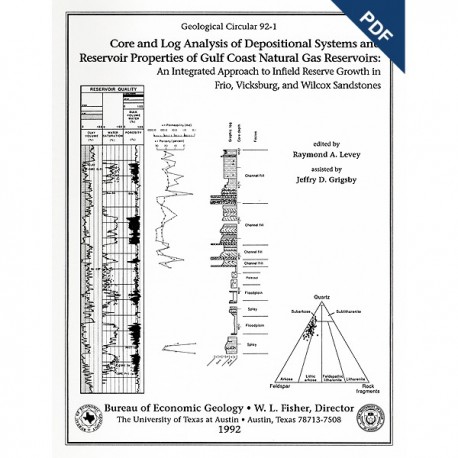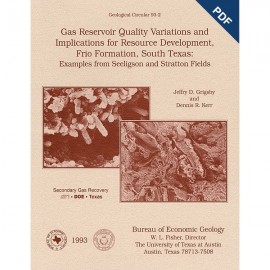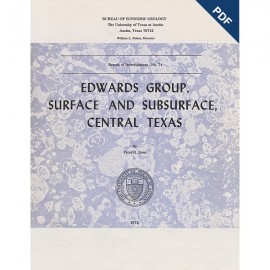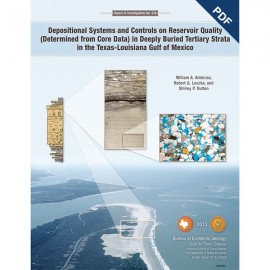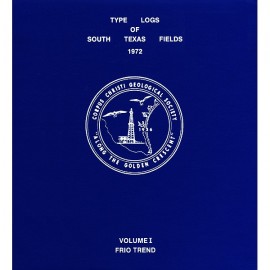Geological Circulars
-
Books & Reports
- Reports of Investigations
- Guidebooks
- Udden Series
- Geological Circulars
- Down To Earth
- Atlases of Major Oil and Gas Reservoirs
- Texas Memorial Museum Publications
- Environmental Geologic Atlas of the Texas Coastal Zone
- Mineral Resource Circulars
- Other Reports
- Seminars and Workshops
- Handbooks
- Submerged Lands of Texas
- Symposia
- Annual Reports
- Open File Reports
-
Maps & Cross Sections
- Thematic Maps
- Miscellaneous Maps, Charts & Sections
- Geologic Atlas of Texas
- STATEMAP Project Maps
- Geologic Quadrangle Maps
- Cross Sections
- Highway Geology Map
- Energy and Mineral Resource Maps
- Shoreline Change and Other Posters
- Wilcox Group, East Texas, Geological / Hydrological Folios
- Bouguer Gravity Atlas of Texas
- River Basin Regional Studies
- Featured Maps
- Posters
- Teachers & the Public
-
Geological Society Publications
- Gulf Coast Association of Geological Societies
- Alabama Geological Society
- Austin Geological Society
- Corpus Christi Geological Society
- Houston Geological Society
- Lafayette Geological Society
- Mississippi Geological Society
- New Orleans Geological Society
- South Texas Geological Society
- GCS SEPM Publications
- Historic BEG & UT Series
Core and Log Analyses of Depositional Systems and Reservoir Properties ... Sandstones. Digital Download
GC9201D
For a print version: GC9201.
GC9201D. Core and Log Analyses of Depositional Systems and Reservoir Properties of Gulf Coast Natural Gas Reservoirs: An Integrated Approach to Infield Reserve Growth in Frio, Vicksburg, and Wilcox Sandstones, edited by R. A. Levey. Assisted by J. D. Grigsby. 56 p., 52 figs., 3 tables, 1992. ISSN: 2475-3637. doi.org/10.23867/gc9201D. Downloadable PDF
To purchase this publication in book format, please order GC9201.
ABSTRACT
The Gas Research Institute, U.S. Department of Energy, and the State of Texas cooperated in joint-venture research to evaluate the infield reserve growth potential of mature gas fields containing conventional reservoirs. Whole cores from fluvial (middle Frio) and deltaic (Vicksburg and Wilcox) reservoirs of the Gulf Coast Basin were compared to diverse types of well logs, analyzed for diagenetic alteration, and calibrated to porosity, permeability, and petrophysical parameters. We have examined genetic depositional units and petrographic characteristics from channel-fill, levee, splay, and associated floodplain deposits from major Frio gas producers such as Stratton and Seeligson fields and deltaic depositional units, including prodelta, delta-front, delta-plain, and transgressive deposits from Vicksburg (McAllen Ranch field) and Wilcox (Lake Creek field) reservoirs.
Traditional logging suites, including gamma-ray response, spontaneous potential, and resistivity, and state-of-the-art logging suites, such as high-resolution density and micro-resistivity, were combined with petrographic methods and reservoir analysis techniques to supplement depositional facies analysis, which was based on core descriptions and well-log interpretation.
Middle Frio Formation gas reservoirs are interpreted as channel-fill and splay deposits. Gas reserve growth potential of Frio Formation reservoirs is influenced by the stacking pattern of the reservoir lithofacies, the presence of upper channel-fill subfacies, and the occurrence of volcanic glass detritus in the reservoir. Minipermeameter measurements of whole cores from middle Frio gas reservoirs indicate that both the lower and upper bounding portions of complete fluvial channel fills are characterized by low permeability; the channel-fill boundaries can be effective barriers to gas flow. The presence of volcanic glass within certain stratigraphic intervals also reduces permeability within middle Frio gas reservoirs.
Vicksburg Formation and Wilcox Group gas reservoirs are interpreted as both delta-front and distributary-channel deposits. Vicksburg and Wilcox gas reserve growth potential is affected by depositional and diagenetic variability. Microresistivity logs from the high-resolution dipmeter and density logs were used to map diagenetic facies, which decrease the effective drainage area among gas-bearing, laterally continuous delta-front sandstone Vicksburg reservoirs. In both the Vicksburg and Wilcox gas reservoirs, depositional control on reserve growth is a function of (1) degree of lateral continuity of delta-front deposits with reduced permeability and (2) presence of discontinuous channel sandstones encased in nonreservoir facies. Diagenetic control is a function of the presence of pore-filling cements affecting permeability and drainage radii within the gas reservoir.
Keywords: deltas, depositional systems, facies architecture, fluvial depositional systems, Frio, natural gas, reserve growth, Vicksburg, Wilcox
Citation
Levey, R. A., ed., 1992, Core and Log Analyses of Depositional Systems and Reservoir Properties of Gulf Coast Natural Gas Reservoirs: An Integrated Approach to Infield Reserve Growth in Frio, Vicksburg, and Wilcox Sandstone: The University of Texas at Austin, Bureau of Economic Geology, Geological Circular 92-1, 56 p. doi.org/10.23867/gc9201D.
